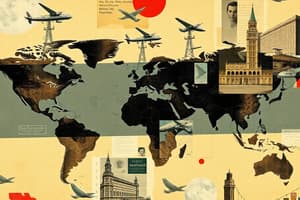Podcast
Questions and Answers
What is the academic background of Lon Schiffbauer?
What is the academic background of Lon Schiffbauer?
- MBA and a PhD in Business Administration
- MBA and a PhD in International Relations
- MBA and a PhD in Industrial Organizational Psychology (correct)
- MBA and a PhD in Economics
What is the main topic of the 12-lecture course?
What is the main topic of the 12-lecture course?
- Principles of International Business (correct)
- Global Economy and Trade
- Cultural Diversity and Business
- International Marketing
What is meant by the term 'integrated' in the context of globalization?
What is meant by the term 'integrated' in the context of globalization?
- Everything is connected and individual parts come together to form a single product or system (correct)
- Economies are isolated from one another
- Countries acting independently in the world economy
- The world economy is controlled by a single government
What is meant by the term 'interdependent' in the context of globalization?
What is meant by the term 'interdependent' in the context of globalization?
Which two countries are used as an example to illustrate the effects of globalization?
Which two countries are used as an example to illustrate the effects of globalization?
What is globalization defined as?
What is globalization defined as?
What is the main characteristic of the globalization of markets?
What is the main characteristic of the globalization of markets?
What does the example of a single cup of Starbucks coffee illustrate?
What does the example of a single cup of Starbucks coffee illustrate?
What is the approximate number of countries where McDonald's has a presence?
What is the approximate number of countries where McDonald's has a presence?
What is an example of international business involving a copper mine?
What is an example of international business involving a copper mine?
What is the main characteristic of a 'made in the USA' labeled product?
What is the main characteristic of a 'made in the USA' labeled product?
What is true about global brands?
What is true about global brands?
Study Notes
-
The speaker, Lon Schiffbauer, introduces himself as the virtual lecturer for the principles of international business course, highlighting his international experience and expertise in the field.
-
Lon Schiffbauer has an MBA and a PhD in industrial organizational psychology, and has lived and worked in various countries, including England, France, Japan, and Malaysia, gaining valuable international experience.
-
The course will explore the concepts, theories, and practices of international business and globalization over the next 12 lectures.
-
The first lecture covers the definition and explanation of globalization, international business, and their effects on daily life.
-
Globalization is defined as the shift toward a more integrated and interdependent world economy, where everything is connected and interdependent.
-
The speaker uses a picture of South Korea and North Korea to illustrate the effects of globalization, with South Korea having a thriving free market economy and North Korea being isolated from the world economy.
-
The concept of integrated means that everything is connected, and the world economy is a fully integrated economy, where individual parts come together to form a single product or system.
-
The concept of interdependent means that countries and economies rely on each other, and the world economy does not recognize borders, with money and business flowing across countries.
-
The speaker provides examples of globalization, including the COVID-19 pandemic, which disrupted global supply chains, and companies like McDonald's, Ikea, and H&M, which operate globally.
-
The globalization of markets refers to the trend of corporations viewing the entire planet as a potential market, rather than being satisfied with distinct national markets.
-
Examples of globalization of markets include companies like McDonald's, Ikea, and H&M, which operate globally and have a significant presence in various countries.
-
The size and power of global markets are significant, with some companies being considered "too big to fail," and their failure could have severe consequences for the global economy.Here is a summary of the text in detailed bullet points:
• McDonald's has around 40,000 restaurants in 119 countries, employing 1.5 million people, making it a global company with international presence.
• The globalization of production involves sourcing goods and services from around the world to take advantage of local differences in cost and quality of labor, materials, capital, and other resources.
• A single cup of Starbucks coffee can depend on as many as 19 countries, highlighting the complexity of global supply chains.
• International business involves cross-border exchanges of goods, services, people, intellectual property, contractual assets, and liabilities between two or more nations.
• Rio Tinto, an Australian company, owns a copper mine in Utah, USA, employing 2,000 people directly and 14,000 indirectly, demonstrating the impact of international business on local economies.
• In 2017, Utah exported $11.5 billion worth of goods and services, with top destinations including the UK, Hong Kong, Canada, China, and Mexico.
• The state of Utah is heavily reliant on international trade, with one in four jobs tied to international trade.
• Many well-known brands have international origins, including Samsung (South Korea), Adidas (Germany), Panasonic (Japan), HSBC (UK), Shell (Netherlands), Gerber (Switzerland), Budweiser (Belgium), and Ben & Jerry's (acquired by Unilever, a British-Dutch multinational).
• Seven-Eleven, a Japanese company, and Haagen-Dazs, an American company, are examples of global brands with complex international connections.
• There is no such thing as a 100% made-in-one-country product, as global supply chains and international trade are deeply interconnected.
• The "made in the USA" label requires that all or virtually all significant parts and processing of a product must be of US origin, with negligible foreign content.
• The origin of raw materials, machinery, and facilities can make it difficult to determine the true country of origin of a product.
• Globalization has led to concerns about job losses, particularly in manufacturing and low-wage sectors, but it has also created new opportunities for international trade and investment.- The manufacturing sector has been significantly impacted by globalization, with industries such as clothing and furniture being moved to countries like Costa Rica and Bangladesh.
- The white-collar sector, intellectual sector, and management sector have also been affected by globalization.
- Real output in the manufacturing sector has increased, but employment has decreased, with automation being a contributing factor.
- Automation is also being done abroad, which has an impact on employment.
- Lack of regulations is a concern in globalization, particularly in areas such as environmental regulations and labor laws.
- Different countries have different regulations, which can lead to manufacturers taking advantage of lower costs and regulations in other countries.
- Environmental impact is a concern in globalization, as different countries have different regulations and enforcement of environmental laws.
- Labor laws and regulations vary by country, leading to concerns about child labor, forced labor, and exploitation.
- The United States Department of Labor estimates that there are 152 million children involved in child labor and 25 million people involved in forced labor worldwide.
- Child labor and forced labor affect many industries, including coffee, sugar, cell phones, gold, chocolate, clothes, toys, sushi, makeup, and leather goods.
- Supranational organizations, such as the UN and World Trade Organization, can impose policies on countries that may not align with domestic interests.
- The World Trade Organization sets policies around international trade that countries must abide by, which can be seen as a threat to national sovereignty.
- The wage gap is exacerbated by globalization, as those with capital and resources are able to benefit from the system, while those without are left behind.
- In the United States, the richest 1% take home 188 times as much as the bottom 90%, and the top 1% income share has doubled since 1969, while poverty has remained steady.
- Globalization has benefits, such as increased economic integration and interdependence, but it also has significant moral, ethical, and economic costs.
Studying That Suits You
Use AI to generate personalized quizzes and flashcards to suit your learning preferences.
Description
This introductory lecture covers the definition and explanation of globalization, international business, and their effects on daily life. Learn about the concepts, theories, and practices of international business and globalization, including the globalization of markets and production.




